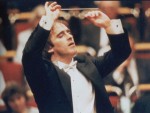Title
Conductor and Juilliard alumnus James Conlon was awarded the Galileo 2000 Prize from the Fondazione Premio Galileo 2000 in a ceremony at the Scuderie Reali della Pace (Royal Stables of Peace) on June 25 in Florence, Italy. Mr. Conlon was the 12th recipient of the prize, which was founded in 1996 and is awarded annually to an artist who has made a significant contribution to music, art, and peace. Past winners include Daniel Barenboim, Zubin Mehta, and Riccardo Muti.
Body
Maestro Conlon, the current music director of the Ravinia Festival, Los Angeles Opera, and Cincinnati May Festival, is beginning the second year of a two-year residency at Juilliard. At the heart of his residency, which consists of performances, symposia, and master classes, is his “Recovered Voices” project, focusing on music by composers who were affected by the rise of Nazism and the events of World War II. Mr. Conlon has been a stalwart champion of composers such as Alexander von Zemlinsky, Viktor Ullmann, Pavel Haas, Erich Korngold, and Erwin Schulhoff, whose works were classified by the Nazi regime as “degenerate art.” Last season, Mr. Conlon conducted the Juilliard Orchestra for the Dance Division’s December Dance Creations, which featured new choreography set to works by “Recovered Voices” composers Franz Schreker, Zemlinsky, and Schulhoff. In April he collaborated with Ensemble ACJW and the Axiom ensemble in a series of concerts dubbed Generative and Degenerate Music, featuring works by Varèse, Milhaud, Stravinsky, and Poulenc on the “generative” side and Schreker, Haas, and Schulhoff on the “degenerate.”
This season, Mr. Conlon will conduct the Juilliard Orchestra on October 27 in Mahler’s Fifth Symphony and the premiere of alumna Ellen Taaffe Zwilich’s Symphony No. 5: Concerto for Orchestra. The following month, he is to conduct the Juilliard Opera Center’s presentation of Trilogy, three rarely performed one-act portraits of marriage by Mussorgsky/Tcherepnin, Ernst Krenek, and Benjamin Fleischmann/Shostakovich.





